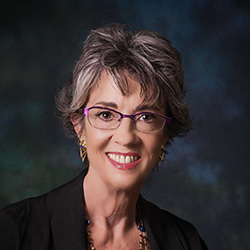Robyn Stone describes what it’s like to be part of a groundbreaking initiative designed to actively engage 2 groups of older adults that researchers in aging often overlook: residents of nursing homes, and older adults with restricted mobility who live at home.
About a year ago, Amy Eisenstein took an important walk across the Chicago campus of LeadingAge member CJE SeniorLife.
Amy had just become director of CJE’s Leonard Schanfield Research Institute. And she really wanted to meet residents of CJE’s Lieberman Center for Health and Rehabilitation.
The visit wasn’t just a formality.
Amy was on a mission. She wanted to see if older adults receiving skilled nursing care at Lieberman would be interested in helping to develop her institute’s research agenda.
Some researchers might view Amy’s invitation as surprising, or even ill advised. They’ve assumed for years that conducting research in nursing homes is just too difficult, primarily due to residents’ functional and cognitive impairments.
Amy doesn’t buy that. And, apparently, Lieberman residents don’t either. They responded enthusiastically to the prospect of actually being consulted about the research questions that are most important to them.
Their willingness to accept Amy’s invitation made it possible for CJE to launch a groundbreaking initiative designed to actively engage 2 groups of older adults that researchers in aging often overlook: residents of nursing homes, and older adults with restricted mobility who live at home.
CJE is calling the initiative the “Bureau of Sages.”
I’m really excited to be a part of it.
WHAT IS A BUREAU OF SAGES?
The Bureau of Sages is a group of 18 individuals who will be working together for the next 2 years to find ways to help researchers and clinicians listen to the voices of older adults and incorporate those voices into our work. The group includes:
- 7 residents of the Lieberman Center for Health and Rehabilitation.
- 5 older adults living at home and participating in CJE’s Virtual Senior Center.
- 6 clinicians and researchers.
The group came together in mid-March for an inaugural getting-to-know-you-retreat. Like my fellow Bureau members, I came away energized and hopeful about what this initiative could mean for LeadingAge and for the field of aging.
THE ART OF LISTENING
The highlight of my day was an “appreciative inquiry” exercise that paired me with a Lieberman resident who is a fellow Bureau member. I asked her to tell me a story about a recent health-related experience that she viewed positively.
My partner’s story didn’t involve an accurate diagnosis or a good test result. Instead, she described one of the few physicians who had ever taken her seriously. What made this doctor so memorable? Unlike all her other doctors, he actually listened to what she had to say.
When other pairs of Bureau members reported on their conversations, it became clear that the older adults in the room were concerned with very real, day-to-day issues like how they function in the world, how they can get where they need to go, and how they can do what they want to do.
Significantly, none of the older Bureau members felt that clinicians and researchers were focusing on those issues.
We’re focusing on identifying and treating illness, when they want more non-pharmacological strategies for relieving pain. We emphasize their deficits, when they’d like to make the most of their strengths.
I expect my fellow Bureau members will be talking more about these and other disconnects during our quarterly retreats. But first we all need to learn how to ask the right questions – and actually listen to the answers.
A GROUNDBREAKING OPPORTUNITY
The Bureau of Sages offers us a groundbreaking opportunity to honor the hard-earned wisdom of older people – and to let that wisdom guide our research and clinical work.
We have a lot to learn. But that’s the whole point of the Bureau.
Over the next 2 years, both groups of Bureau members – researchers/clinicians and older adults – will get the training we need to make this initiative a success.
Older adults will be working with CJE to learn more about how the research process works and the best ways to identify and articulate their needs. Researchers and clinicians are counting on our older colleagues in the Bureau to teach us how to become better listeners.
In the end, I hope our 2-year experiment will result in a replicable model for identifying the health-related outcomes that older adults want clinicians to strive for and researchers to measure.
A GROUNDBREAKING AWARD
The Bureau of Sages was funded through a Eugene Washington Engagement Award from the Patient-Centered Outcomes Research Institute (PCORI).
This is significant.
PCORI is an independent, nonprofit, nongovernmental organization that was authorized by Congress to foster person-centered outcomes research.
Most of PCORI’s work to date has focused on patients receiving primary and acute care. So it’s great to see this influential organization supporting an effort to address the questions and concerns most relevant to older adults who are living their lives while receiving long-term services and supports.
A GROUNDBREAKING MEMBER
I’m thrilled that CJE SeniorLife is serving as a champion and role model for incorporating the voice of diverse older populations into research.
This sends a powerful message to consumers and researchers alike that not-for-profit providers and LeadingAge members can have a transformative influence on the field of aging services.
I applaud CJE’s efforts to engage older adults in its work – and I invite other LeadingAge members to do the same.

Robyn I. Stone, DrPH, is senior vice president of research at LeadingAge, and co-director of the LeadingAge LTSS Center @UMass Boston. Her widely published work addresses long-term care policy and quality, chronic care for people with disabilities, the aging services workforce, affordable senior housing, and family caregiving.
